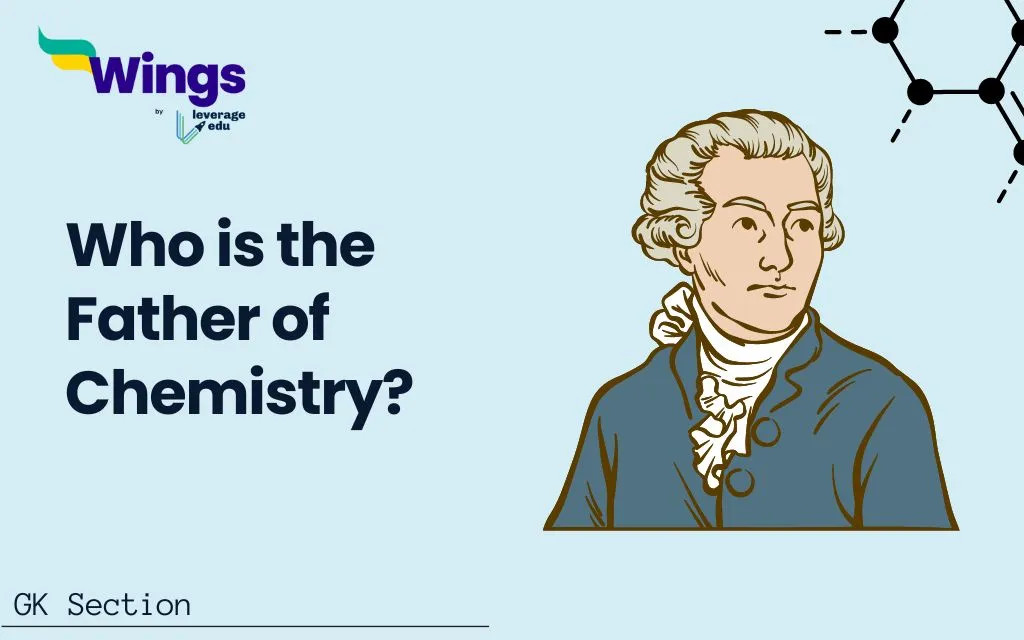In the field of chemistry, one name stands out as a major game-changer: Antoine Lavoisier. He is often called the “Father of Chemistry” because his work totally transformed how we understand chemical reactions. Read this article on “Who is the Father of Chemistry?” and learn more about his big discoveries and their lasting impact in the field of chemistry. This topic will also help you to prepare for various examinations, which include scientific questions and inventors.
| Revolutionary Discoveries | Impact on Chemistry |
| Law of Conservation of Mass | Established that mass is conserved in chemical reactions, laying the foundation for modern chemistry. |
| Identification of Oxygen | Introduction to Systematic Nomenclature |
| Introduction to systematic Nomenclature | Developed a logical naming system for chemicals, providing clarity and order in chemical classification. |
| Disproved Phlogiston Theory | Debunked the outdated idea of phlogiston, advancing understanding of combustion and oxidation processes. |
Lavoisier’s Big Discoveries
Lavoisier’s work is still celebrated today because it set the stage for modern chemistry. His dedication to experimentation, figuring out the truth and his groundbreaking discoveries, all helped shape the field of chemistry as we know it.

So next time you hear about a chemical reaction, remember Lavoisier, the “Father of Chemistry,” who helped us understand the amazing world of changing matter.
- Lavoisier figured out that during a chemical reaction, matter cannot be created or destroyed, it just changes form. This might seem obvious today, but back then it was a revolutionary idea!
- Lavoisier identified oxygen as a super important element for burning things (combustion) and even for living things to breathe.
- Lavoisier realized scientists needed a clear system for naming chemicals. He came up with a logical way to do this based on the properties of the elements involved, which laid the groundwork for how we name chemicals today.
- Lavoisier disproved a popular theory at the time called the “phlogiston theory” which thought burning things released a mysterious substance. His work helped pave the way for a modern understanding of how burning actually works.
Also Read: BSc Chemistry Syllabus and Subjects 2025
Chemistry’s Founding Fathers and Their Impact
Chemistry is a constantly evolving field, but its foundation rests on the work of early founders. Here’s how their contributions continue to shape the world of chemistry:
- Chemists like Lavoisier and Dalton established the fundamental principles of matter, elements, and reactions. These concepts are the building blocks for all further chemical studies.
- Thanks to the work of scientists like Marie Curie and Robert Boyle, we have essential tools and techniques like radioactivity measurement and the gas laws. These continue to be crucial in modern research.
- The groundbreaking discoveries of these experts continue to inspire new generations of chemists. Their work sparks curiosity and pushes the boundaries of what’s possible.
- The methods and approaches developed by early chemists laid the groundwork for scientific inquiry in chemistry. Their thought processes continue to guide problem-solving in the field today.
- Every new discovery in chemistry builds upon the work of those who came before. These founders provided the foundation for countless advancements in medicine, materials science, and technology.
FAQs
Antoine-Laurent Lavoisier is often referred to as the “Father of Chemistry” for his foundational discoveries and contributions.
The ancient Greeks, particularly Alchemists like Democritus and Empedocles, laid early groundwork for the study of chemistry.
While not a literal title, Robert Hooke’s pioneering work in microscopy contributed significantly to understanding biological structures and chemistry.
Dmitri Mendeleev, creator of the periodic table, is often called the “godfather of modern chemistry” for his profound organizational contributions.
Related Posts
| 23 Interesting Facts About Chemistry | Indian Scientists Who Changed the World |
| Who Are the Founding Fathers of Physics? | What is the Full Form of IUPAC? |
| Famous Inventions and Inventors in Different Fields | 10 Scientific Experiments That Were Ahead Of Their Time |
This was all about the “Who is the Father of Chemistry? ”. For more such informative blogs, check out our UPSC Exams Section and Study Material Section, or you can learn more about us by visiting our Indian exams page.


 One app for all your study abroad needs
One app for all your study abroad needs












 60,000+ students trusted us with their dreams. Take the first step today!
60,000+ students trusted us with their dreams. Take the first step today!